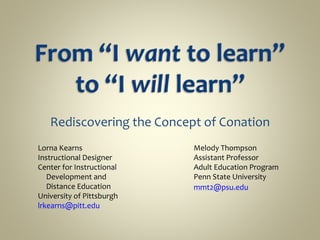
Sloan 2010 conation presentation
- 1. Rediscovering the Concept of Conation Melody Thompson Assistant Professor Adult Education Program Penn State University mmt2@psu.edu Lorna Kearns Instructional Designer Center for Instructional Development and Distance Education University of Pittsburgh lrkearns@pitt.edu
- 2. Situate conation within the learning domain landscape Recognize its importance to adult learning and distance learning Discuss how to support and develop conation among your students Introduce some Web 2.0 tools
- 3. Plato’s Tripartite Soul (4th century BC) Rational soul (mind/intellect) Spirited soul (will/volition) Appetitive soul (emotion/desire) Scottish and German Psychologists (1700s) Three faculties of mind: Cognition (knowing) Affect (valuing; emotion) Conation (striving; volition)
- 4. 1932 “We say we are trying, striving, endeavoring, paying keen attention, making an effort, working hard, doing our utmost, exerting ourselves, concentrating all our energies; in technical terms, we are manifesting conation.” --William McDougall The Energies of Men 1980 Hilgard calls for a renewed effort to investigate affective and conative constructs involved in learning.
- 5. 1987 – Atman proposes a model of conative goal accomplishment for distance learners 7. Organize 8. Make it happen 9. Don’t procrastinate 10. Finish what you start 11. Evaluate 12. Fit into long-range purpose 1. Recognize need, problem, challenge, opportunity 2. Set goal 3. Brainstorm alternatives 4. Assess risks 5. Select strategy 6. Visualize finished project
- 6. Conation Cognition Affect •What do I want to work toward? Why? •How do I set and manage my learning goals? •How do I achieve my goals? •How do I learn new information? •How do I come to understand? •How do I create new knowledge? •How do I feel about my learning? •How do I feel about what I know? Knowledge EmotionBehavior
- 7. Motivation Volition •Need for achievement •Fear of failure •Self-esteem •Self-efficacy •Personal interests and attitudes •Persistence •Will to learn •Mental effort investment •Mindfulness in learning •Attitudes about the future •Work ethic •Self-regulation of goal-oriented behavior •Awareness of short-term and long-term goals and consequences Pre-decisional Post-decisional “I want to learn” “I will learn”
- 9. Self-directed learning is a process by which learners take the initiative to: Diagnose their learning needs Formulate learning goals Identify resources for learning Choose and implement appropriate learning strategies Evaluate learning outcomes (Knowles, 1975) Self-regulated learning encompasses the processes by which learners achieve learning goals.
- 10. Persistence among adult learners is a continuing concern. It can be affected by: Competing demands for time Competing demands for resources Need to respond to unanticipated events Role conflicts Lack of integration with learning community Institutional focus on younger learners
- 11. Although the cognitive and affective perspectives suggest that a student will “do” something, they don’t address the energy requirements necessary for “doing.” As Maslow noted, “healthy people are more integrated…In them the conative, the cognitive, the affective, and the motor are less separated from each other…working collaboratively without conflict to the same ends.”
- 12. 1. Direction 2. Energizing 3. Persistence Plan Start Finish
- 13. Self-awareness Visions of possibilities Making choices Goal-setting Planning
- 14. Sense of achievement Pride Pleasure External rewards Resource investment Discomfort of change Fear of failure Benefits Costs “In general, the potential for pleasure resulting from striving and obtaining dreams, desires, and goals must outweigh the discomfort of change or fear of failure if action is to be taken.” --Huitt, 1999
- 15. Regular monitoring of thoughts, emotions, and behavior Evaluation of strategies and progress Appropriate attribution Resourcefulness Attentional control Emotional and motivational control Adaptive help-seeking Goal protection
- 16. Direction Energizing Persistence • Imagine possibilities • Make decisions • Identify goals • Develop plans • Overcome inertia • Develop and regulate self- esteem • Focus attention • Manage emotions • Practice self- renewal strategies • Control attention • Monitor emotions and behavior • Evaluate progress • Reward completion
- 17. What can you do to help students… Imagine possibilities? Set attainable goals? Develop goal achievement plans? Implement plans? Practice self-observation? Reflect on progress? Seek help appropriately? Manage emotions?
- 18. Angermeier, Markus. Web 2.0 universe map. Licensed under Attribution-NonCommercial-ShareAlike 2.0 Germany. Retrieved May 19, 2010 from http://kosmar.de/wp-content/web20map.png
- 19. Wikis Blogs
- 20. 1. Recognize need, problem, challenge, opportunity 2. Set goal 3. Brainstorm alternatives 4. Assess risks 5. Select strategy 6. Visualize finished project 7. Organize 8. Make it happen 9. Don’t procrastinate 10.Finish what you start 11. Evaluate 12.Fit into long-range purpose
- 21. Web-based groupware application for: • Creating, editing and hosting HTML pages • Version tracking • Page linking and organization
- 22. “We thought that networking was a way that we could share resources with one another … thereby multiplying our learning process.” “...it was a way of collaborating even though not seeing each other.” “I gained a lot of confidence and also appreciation of the work by sharing and learning from my peers on the wiki.”
- 23. 1. Recognize need, problem, challenge, opportunity 2. Set goal 3. Brainstorm alternatives 4. Assess risks 5. Select strategy 6. Visualize finished project 7. Organize 8. Make it happen 9. Don’t procrastinate 10.Finish what you start 11. Evaluate 12.Fit into long-range purpose
- 24. Web log or journal to which students can post text, images, and hyperlinks
